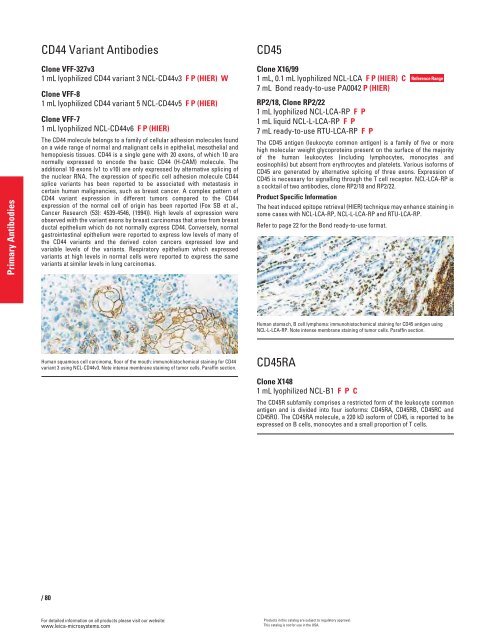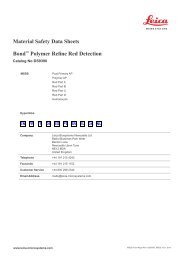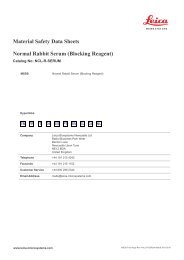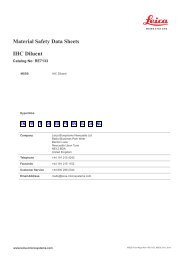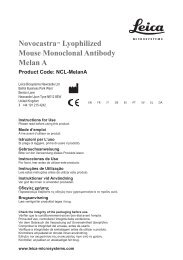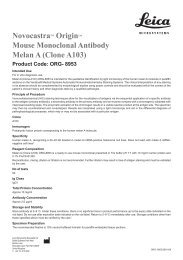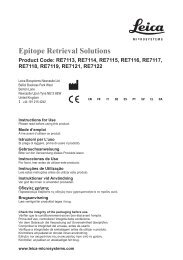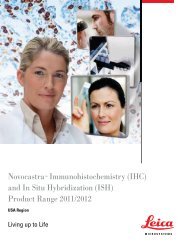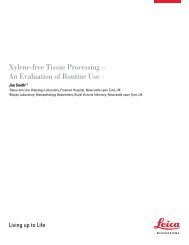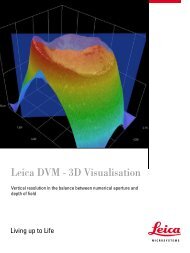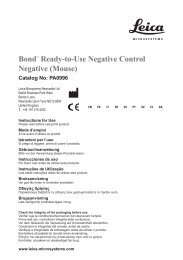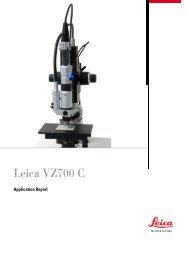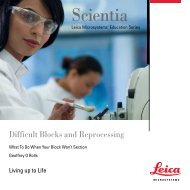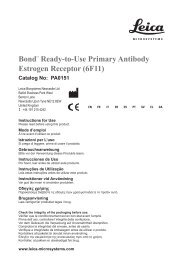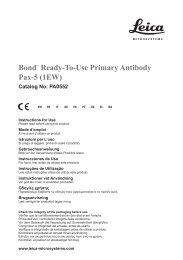Labelling Review row-Online
Labelling Review row-Online
Labelling Review row-Online
You also want an ePaper? Increase the reach of your titles
YUMPU automatically turns print PDFs into web optimized ePapers that Google loves.
Primary Antibodies<br />
CD44 Variant Antibodies<br />
Clone VFF-327v3<br />
1 mL lyophilized CD44 variant 3 NCL-CD44v3 F P (HIER) W<br />
Clone VFF-8<br />
1 mL lyophilized CD44 variant 5 NCL-CD44v5 F P (HIER)<br />
Clone VFF-7<br />
1 mL lyophilized NCL-CD44v6 F P (HIER)<br />
The CD44 molecule belongs to a family of cellular adhesion molecules found<br />
on a wide range of normal and malignant cells in epithelial, mesothelial and<br />
hemopoiesis tissues. CD44 is a single gene with 20 exons, of which 10 are<br />
normally expressed to encode the basic CD44 (H-CAM) molecule. The<br />
additional 10 exons (v1 to v10) are only expressed by alternative splicing of<br />
the nuclear RNA. The expression of specific cell adhesion molecule CD44<br />
splice variants has been reported to be associated with metastasis in<br />
certain human malignancies, such as breast cancer. A complex pattern of<br />
CD44 variant expression in different tumors compared to the CD44<br />
expression of the normal cell of origin has been reported (Fox SB et al.,<br />
Cancer Research (53): 4539-4546, (1994)). High levels of expression were<br />
observed with the variant exons by breast carcinomas that arise from breast<br />
ductal epithelium which do not normally express CD44. Conversely, normal<br />
gastrointestinal epithelium were reported to express low levels of many of<br />
the CD44 variants and the derived colon cancers expressed low and<br />
variable levels of the variants. Respiratory epithelium which expressed<br />
variants at high levels in normal cells were reported to express the same<br />
variants at similar levels in lung carcinomas.<br />
Human squamous cell carcinoma, floor of the mouth: immunohistochemical staining for CD44<br />
variant 3 using NCL-CD44v3. Note intense membrane staining of tumor cells. Paraffin section.<br />
/80<br />
For detailed information on all products please visit our website:<br />
www.leica-microsystems.com<br />
CD45<br />
Clone X16/99<br />
1 mL, 0.1 mL lyophilized NCL-LCA F P (HIER) C<br />
7 mL Bond ready-to-use PA0042 P (HIER)<br />
RP2/18, Clone RP2/22<br />
1 mL lyophilized NCL-LCA-RP FP<br />
1 mL liquid NCL-L-LCA-RP FP<br />
7 mL ready-to-use RTU-LCA-RP FP<br />
The CD45 antigen (leukocyte common antigen) is a family of five or more<br />
high molecular weight glycoproteins present on the surface of the majority<br />
of the human leukocytes (including lymphocytes, monocytes and<br />
eosinophils) but absent from erythrocytes and platelets. Various isoforms of<br />
CD45 are generated by alternative splicing of three exons. Expression of<br />
CD45 is necessary for signalling through the T cell receptor. NCL-LCA-RP is<br />
a cocktail of two antibodies, clone RP2/18 and RP2/22.<br />
Product Specific Information<br />
The heat induced epitope retrieval (HIER) technique may enhance staining in<br />
some cases with NCL-LCA-RP, NCL-L-LCA-RP and RTU-LCA-RP.<br />
Refer to page 22 for the Bond ready-to-use format.<br />
Human stomach, B cell lymphoma: immunohistochemical staining for CD45 antigen using<br />
NCL-L-LCA-RP. Note intense membrane staining of tumor cells. Paraffin section.<br />
CD45RA<br />
Clone X148<br />
1 mL lyophilized NCL-B1 FPC<br />
The CD45R subfamily comprises a restricted form of the leukocyte common<br />
antigen and is divided into four isoforms: CD45RA, CD45RB, CD45RC and<br />
CD45RO. The CD45RA molecule, a 220 kD isoform of CD45, is reported to be<br />
expressed on B cells, monocytes and a small proportion of T cells.<br />
Products in this catalog are subject to regulatory approval.<br />
This catalog is not for use in the USA.<br />
Reference Range


